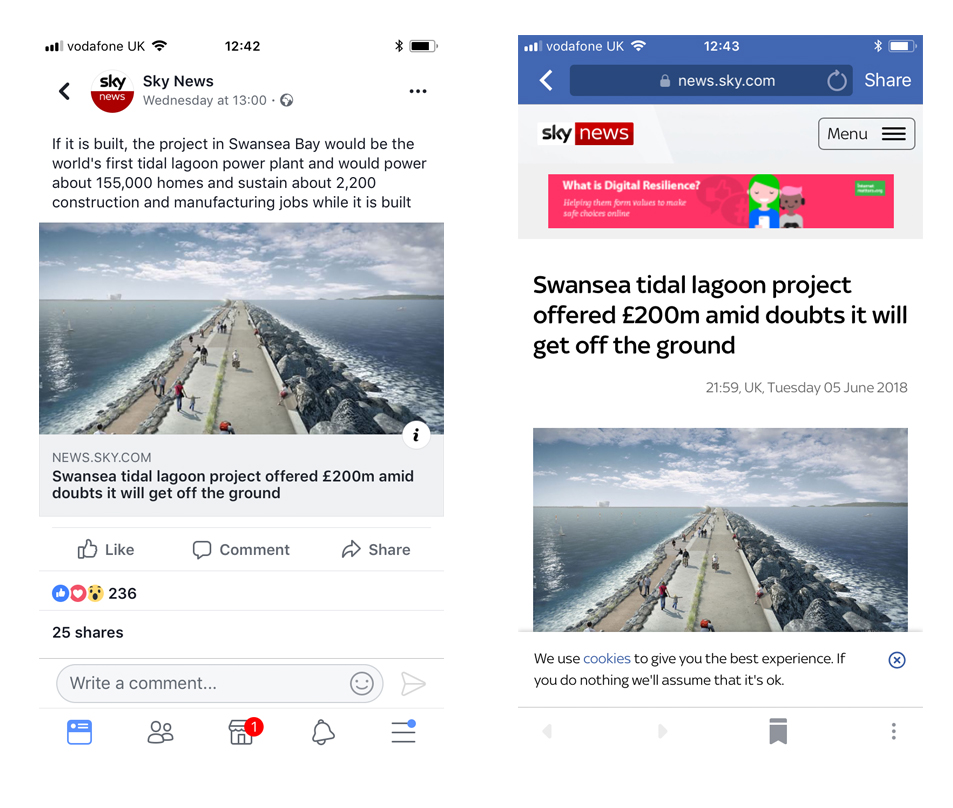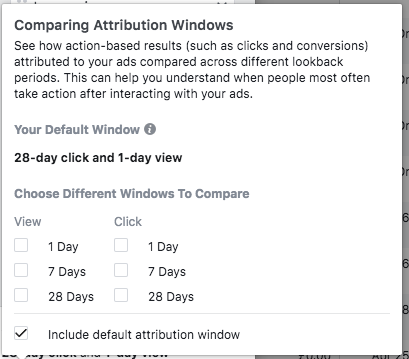We’re often asked by people why their Google Analytics (GA) and Facebook ads tracking statistics do not match. This can be really confusing when you’re trying to review how well your ads are doing and frustrating when trying to make decisions relating to your strategy. So, which one is correct? And what is the reason for the difference?
In short, both GA and Facebook’s statistics are correct, but they use different metrics and record in different ways which we will explain below.

1. People tracking vs cookies
Facebook’s main advantage over GA tracking is that it measures people via their user ID’s rather than cookies. This means that Facebook can recognise a person across multiple devices and browsers as the same person. GA, however, is unable to do this and will record the same person using different browsers and devices as different people.

Boost E-Commerce ROI: Download Our Free CPA & ROAS Calculator
A good example of this would be a user clicking a Facebook ad on their phone and seeing a product they would like to buy. They may not purchase straight away (people are often busy, they get distracted or don’t like to complete purchases on their phone) so they decide to come back later on their laptop. When the purchase is made on the laptop, Facebook will recognise this as a cross device conversion, whereas GA will not be able to recognise that this sale came from Facebook as the person is now using a different device.
The result of these different reporting methods are that within GA Facebook may appear less efficient, whilst within Facebook’s reporting system you’re getting different numbers. This is a significant difference to recognise at a time when people are using mobile devices so much more to browse but still converting on computers and laptops.
2. Facebook not being recorded as the referrer
Sometimes, when using mobile, a link that you click on Facebook’s mobile app opens in an in-app browser. Whilst Facebook is the referrer in these instances, browsers don’t always log it as such.
For example, a user may see a post in your newsfeed and click it to learn more. The browser will then be opened within the Facebook app rather than taking you out of the app and into the browser externally. In these instances, Google Analytics may not always recognise that the user has accessed the website via Facebook, instead recording it as organic traffic. Facebook, however, will always recognise itself as the referrer. This could lead to tracking discrepancies.
 An example of an in-app browser
An example of an in-app browser
A potential solution to this is by setting the medium, source, campaign and content attributes into the link. For example:
Check out GA’s URL builder to help you with this.
 Google Analytics URL builder data fields explainer
Google Analytics URL builder data fields explainer
3. Conversion attribution date
You need to be aware that Facebook and GA record conversion dates differently.
When a person takes an action on your website, such as purchasing a product after viewing an ad, Facebook attributes this action to the ad within a certain amount of days (the attribution window). What this means is that whilst you may wonder why this is a feature, it is actually quite useful as it allows a consideration period for purchasers.
If you still don’t want your Facebook tracking to work in this way there is the option to change it within Facebook’s Settings. Whilst the default time-period that Facebook will attribute an action back to an ad is within 28 days, you do also have the option to set it to 1, 7 or 28.
Having a longer attribution window does make it more difficult when comparing conversions to Google Analytics. Google Analytics records conversion dates as the date of the acquisition itself (in the scenario above the attribution date would be recorded as 30th May on GA). It’s also worth noting that statistics measured at daily intervals may be based on different time zones.

4. Google Analytics last click attribution
As pointed out in section 3, GA and Facebook each use differing attribution models which can lead to differences in recorded tracking. Facebook’s model creates attributions from post views and post clicks, whilst. Google Analytics attributes conversions to the last click (with a default attribution window of 30 days).
For example, if someone clicked a Facebook ad and didn’t convert straight away, but later that day made a purchase after going directly to the website or clicking a link in an email, GA would not attribute the sale to Facebook. This means that for those of you running multi-channel campaigns, whichever receives that last click before a conversion will gain the GA attribution. Whereas in Facebook, regardless of whether they viewed or clicked the ad, the conversion will show. This is important to note.
5. Javascript bug
Javascript bugs can prevent Google Analytics tags from firing.
Bugs can occur when Javascript conflicts with other scripts on a page. Cookies being held in a person’s browser can be altered by other applications leading to a false or unrecorded session or page view by Google Analytics. This can easily be prevented by testing out landing pages specifically from Facebook’s app. Ads Manger allows you to preview adverts on mobile so make sure you do this when posting new ads
6. Google Analytics tags
During the time between a user clicking on an ad and the ad being directed to your site a user may change their mind and return back to Facebook or leave the app. This is more common on mobile if your site is taking too long to load. More often than not this means that the Google Analytics tag will not be fired and tracking will be lower than Facebook. Take care to make sure your site is functioning well and try to reduce loading times as much as possible.
Top tip: Google’s PageSpeed insights is a useful tool which can be used to improve mobile loading speed, which in turn will reduce the amount of people returning to Facebook or leaving the app post-click.

7. HTTP/ HTTPS headers
A few years ago Google was encouraging site owners to move from http to secure https headers. This led to many sites being moved and redirects being put in place to the new https version of the site from the http version. In these instances, GA collects referral information from the http header rather than from Facebook. This means that referrals are not attributed to ads and are treated as organic. This is also the case when someone moves from https to http. These scenarios can lead to high levels of under-reporting Facebook conversions and a supposed increase in organic traffic.
8. Cookies and ad blockers
Google Analytics requires that the user’s browser have cookies enabled in order to record statistics, which may result in under-counting purchases relative to what is reported by Facebook Ads.
Similarly, ad blockers may prevent the Facebook Pixel from recording correctly leading to underreporting. The most efficient way to check if your Pixel is working is to use the Chrome Pixel Helper plug-in – this can be downloaded from the Google app store and allows you to see if a Pixel is installed on a website, check it for errors, and interpret the data coming from it. To use this, you need to have Chrome installed as a browser.
 Facebook Pixel Helper confirming a pixel is installed correctly
Facebook Pixel Helper confirming a pixel is installed correctly
It’s clear that there is no uniform manner in which 3rd party trackers and ad networks can track activity together. Primarily this is down to the data they have available to them, and the manner in which they are able to track people online. Facebook on the one hand has the benefit of knowing exactly who a user is and what their Facebook ID is, and therefore can track cross-device conversions. While Google Analytics is limited to relying on cookie data.
Ideally, you will have internal data that you are able to use to match up your conversions, and attribute referrals where you can. If this isn’t possible, then choose the attribution model that works best for you.
Wrap up
Ready to elevate your business? Check out our Facebook advertising agency and see how we can help you achieve incredible results!
All in all, there are a lot of reasons for the differences between Google Analytics tracking and Facebook tracking. These methods will also have differences with other third party trackers. It’s important to know that neither tracking methodology are right or wrong and to take into consideration the points above.







